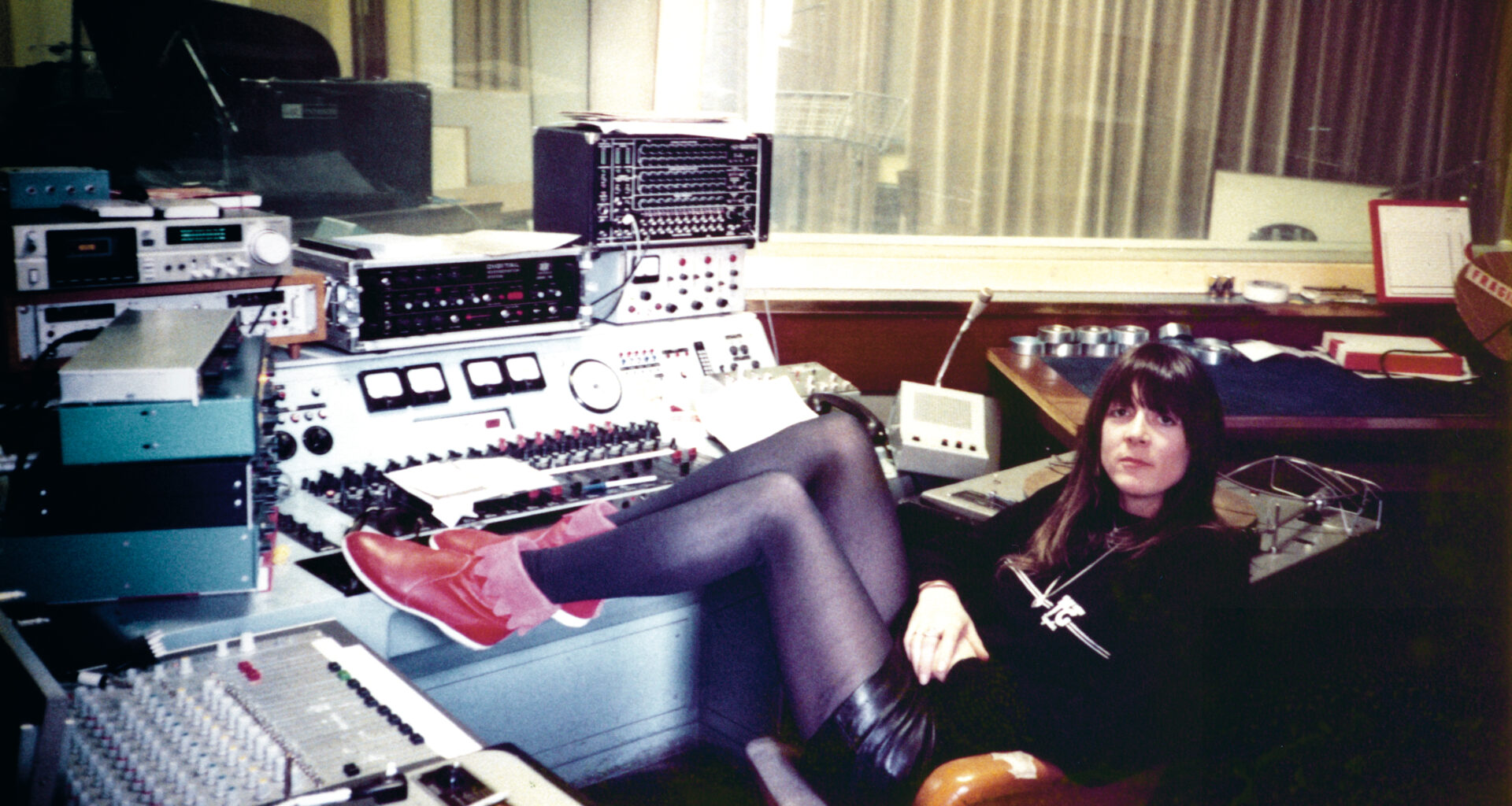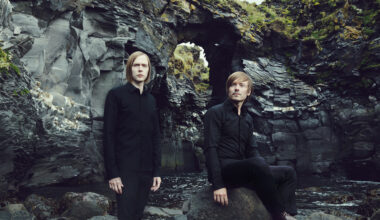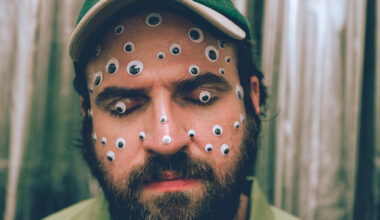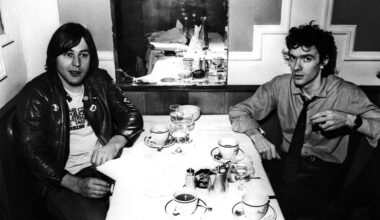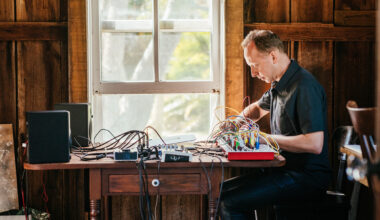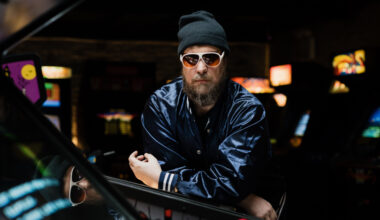From art provocateur to porn star to electronic music legend (Throbbing Gristle, Chris & Cosey, Carter Tutti), there’s nobody quite like Cosey Fanni Tutti. Which is perhaps just as well. No wonder her autobiography – ‘Art Sex Music’, a title that pretty much sums up her incredible life – is every bit as revealing and shocking and fascinating as you might imagine
Cosey Fanni Tutti – avant-garde and electronic music pioneer, radical art agitator and one-time pornographic model – lives in one of the most dangerous parts of the world. Well, one of the most dangerous parts of Norfolk.
“You do have to be careful out there, especially after dark,” says Cosey as we sit at her kitchen table in the former village school near the Norfolk-Lincolnshire border that she and her long-time partner Chris Carter bought some three decades years ago.
She’s not kidding. Night driving is hazardous in the Fens. Beyond the lights of the little clusters of houses that are dotted about, it quickly gets pitch black. The roads are often long and straight, encouraging drivers to put their foot down, but most have deep watery ditches cut into the land both left and right. The roads are extremely narrow too. Steer your car just an inch off the tarmac and you’ll be in the drink before you know it.
As it goes, I know these roads well. My dad grew up in the village next to Cosey’s. Our family owned the local bakery for several generations, going right back to the 18th century. My dad left the area when he was 20, but moved back after he’d retired. When I call him up and tell him that I’m interviewing someone who lives in the old school in the neighbouring village, he reels off the names of his many cousins and friends who went there. He has a vague memory of going there himself for a term – “The war was on, so I think it must have been 1940 or 1941” – while his own school was closed for repairs for a few weeks.
“Who are you interviewing?” he asks me. “I didn’t know we had a pop star here.”
“Cosey Fanni Tutti. She’s not a pop star, dad. Not exactly. She’s more, er… She’s like, er… Someone once called her a wrecker of civilisation.”
“Ah, another of your bloody weirdos,” he chuckles. And then, after a pause of about a millisecond, he says, “Oh, I tell you who’s dead. Ernie Jackson. It was in the paper yesterday. Don’t be daft, of course you remember Ernie. That’ll be a big funeral. There’ll be a lot there for that one.”
I’ve come to talk to Cosey about ‘Art Sex Music’, her recently published autobiography. It’s a remarkable story, as anybody who knows anything about Cosey Fanni Tutti will know before they’ve even picked the book up. You’ve got to read it. You’ve simply got to.
She was born Christine Newby in Hull in 1951, joining the performance art collective COUM Tranmissions after meeting COUM founder Genesis P-Orridge within days of her turning 18. It was Genesis who dubbed her Cosmosis, a name which later developed into Cosey Fanni Tutti, and the pair soon became lovers. Moving from Hull to London, COUM morphed into Throbbing Gristle with the addition of Chris Carter and Peter “Sleazy” Christopherson. The new group made their live debut in 1976, at COUM’s hugely controversial ’Prostitution’ exhibition at the ICA, which included some of Cosey’s early porn work and prompted a Tory MP to describe her and her cohorts as “wreckers of civilisation”.
‘Art Sex Music’ documents all this and much more besides. How Cosey’s relationship with Genesis turned sour. How TG split in 1981 and then came back together in 2004. How Cosey’s parallel life as a porn model and a stripper in the 1970s and 1980s gave her both money and an important creative outlet. How she fell in love with Chris Carter around the time of the ICA show and how their post-TG work as Chris & Cosey and Carter Tutti has expanded the frontiers of electronic music. How the couple left London shortly after the birth of their son Nick, who is now in his 30s. How Cosey remains one of the UK’s most celebrated contemporary artists, with several pieces on permanent display at the Tate. How she’s coped with some pretty serious health problems in recent years.
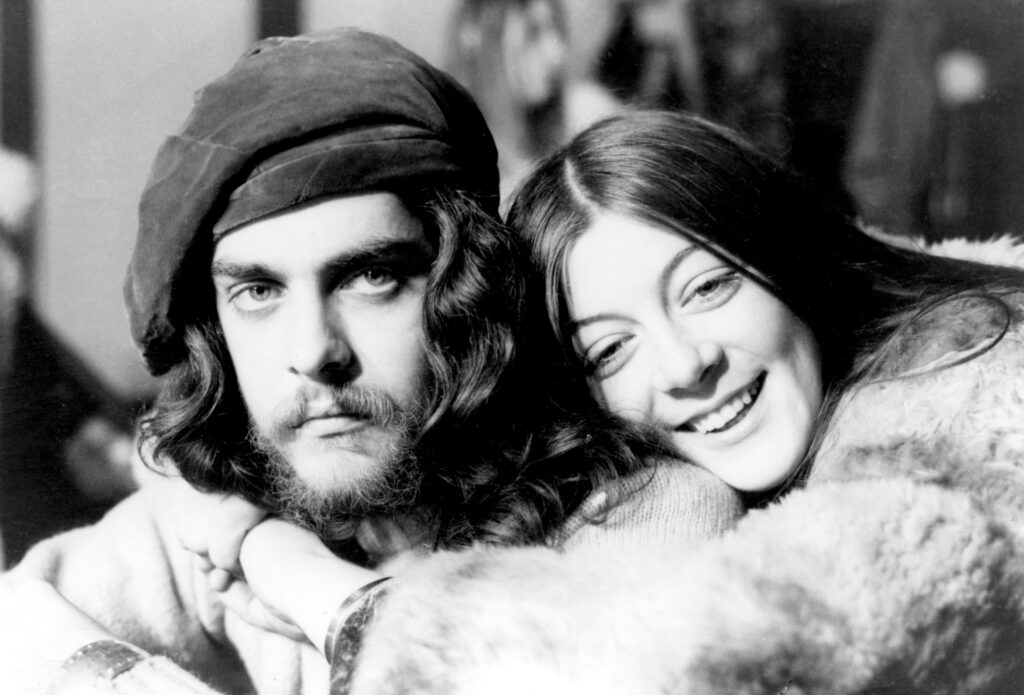
The result is a painstakingly detailed and extraordinarily personal work, with excerpts from Cosey’s diaries acting as a sort of click track throughout the book. The first diary extract is from 1966 and the last is from 2014. I ask her if writing the book affected the way that she saw herself.
“It did, yes, but I’m still trying to figure out what it’s done to me,” she replies. “It was great to get it all out. It was cathartic, but it wasn’t therapeutic in any way, because I’ve never hidden away from anything that has happened to me. I’ve never tried to bury anything. I’ve never thought, ‘Fuck, I can’t bring that with me because I can’t face it’. I’ve always faced everything head on.”
From almost the first page, it’s clear that the young Christine Newby had a very troublesome relationship with her father. Cosey left home as soon as she could and she last saw her dad in 1972, almost 30 years before he died. Was it difficult for her to write about him?
“It was and it wasn’t. He was a hard person, my dad. Even with his brothers and other members of the family. But I think he was tougher on me because I was his child and he could say what went and what didn’t. And if I didn’t like it, I could get out. Which I did.”
You’re utterly unforgiving of your dad in the book.
“I am, but the weird thing is if someone else had a go at him, I’d want to protect him. I was saying this to my sister Pam the other day. Deep down, he’s still my dad. I mean, he wasn’t a Fred West or anything. He was just really strict. He knocked me about a bit, but that was punishment, not because he felt like it.”
But your problems with you dad also had an impact on your relationship with your mum, didn’t it?
“Hugely. She was lovely, my mum. After I left home, she kept in touch with me without my dad knowing. She went behind his back. My mum and dad were like me and Chris, they were really close, so it was hard for her to do that. She stopped after the ICA exhibition. That was it. She could no longer defend me after that. And my dad had had a heart attack by that point, so she focused on him from then on. Ironically, she died a long time before he did. I felt robbed by that. I really did. I wanted him to go first so my mum could meet Chris and our son Nick.”
So neither your mum nor your dad ever met Chris or Nick?
“No. Never.”
The title ‘Art Sex Music’ reflects Cosey’s character as well as her interests. Straight, upfront, to the point. Does what it says on the tin. I ask if she chose to put those three words in chronological order. First came the art, then came the sex, then came the music. I also ask what the title of the book would be if she’d put art, sex and music in order of importance to her.
“I don’t know,” she says with a hearty laugh. “But they are the three main threads of my life and they’re always interconnected. It’s weird. Yeah, it was the art that came first. I remember being a small child on the floor of the living room, cutting things out and sticking things together, collaging I suppose, and painting and drawing all the time.
“The sex was next, but I was a late starter actually. I was 17. I was quite particular about who I let put their hands on me. All my friends lost their virginity before me. The girls in my school were putting it about very early. Or that’s what they said. I remember one of the girls coming to school wearing hush puppies, which were really in with the mods at the time, and she was really proud because she had a spunk stain on one of these shoes. She was like, ’Look, I wanked him off in the park’. I was like, ‘Oh, that’s what spunk looks like, is it? A stain on a shoe’.”
We discuss how the worlds of art and music have changed since the 1970s. The sex industry too. There’s a kind of innocence to the way Cosey writes about working as a porn model back then.
“Well, I was innocent at the start,” she grins. “The whole point of it was I’d learn a bit as I went along.”
The 1970s sex industry itself seems to have been quite innocent too. Or have I misinterpreted that?
“It was very underground and pretty much illegal then. So you entered a world that was quite seedy and dark, which in itself was appealing to me. A lot of the people who were involved in pornography then were drop-outs from the 60s. They came to it through the love-ins and the orgies, from the free love scene, and they were like, ‘Yeah, let’s film what we’re doing’. But then you also had the hardcore guys and they weren’t like that at all.”
If you were 25 now, would you want to work in the sex industry the way it is today?
“I’m not sure. It’s all seems really ramped up. Then again, if I was 25 now, I’d have the mindset of a 25-year-old, so I’d probably think differently about it.”
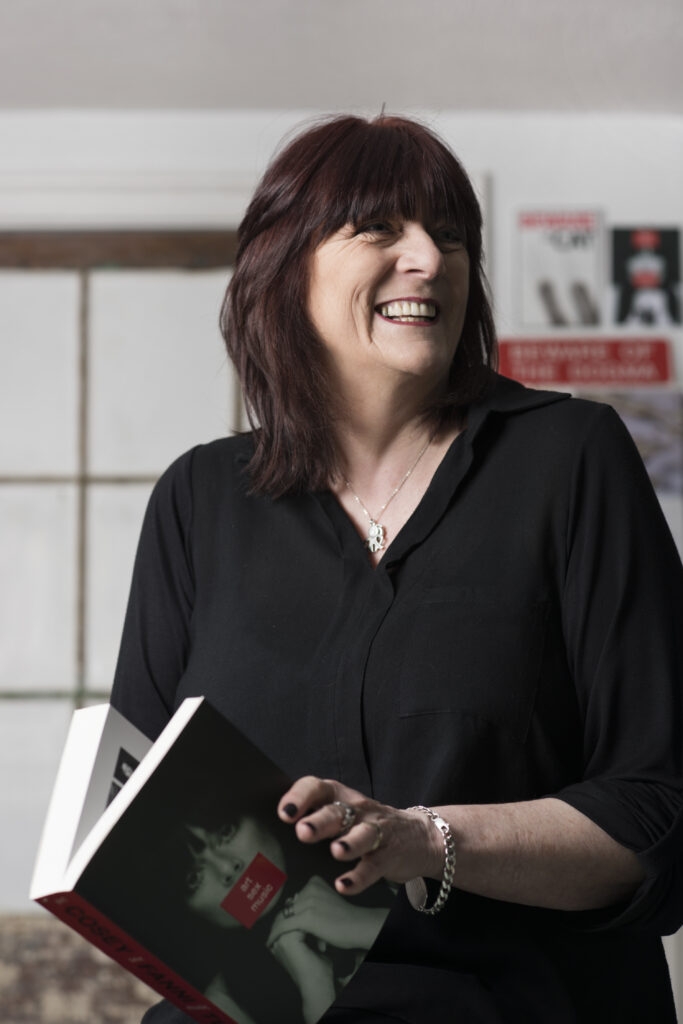
The line, “My Art is My Life, My Life is My Art” appears more than once in ‘Art Sex Music’. But then at another point Cosey writes, “Art is Life is tough going”. There’s no suggestion that she ever considered compromising on her art, though. Or anything else for that matter.
“No, because that’s who I am,” she explains. “I couldn’t be any other way. It’s not a career to me. I mean, a career is something you do for a living and, at some point, it ends and you retire. I don’t see my life like that. I see my life as doing what I want to do every day because I don’t feel right otherwise. It’s more like a compulsion. I can’t not do it. I don’t feel whole unless I’m creating something.”
Is it the same for making music?
“It is the same, yeah. The only one I’ve missed out is sex. It’s terrible, isn’t it? I’m an art and sex and music addict.”
There are worse things to be.
“Exactly. It’s done me all right.”
As you’d expect, Cosey’s Throbbing Gristle bandmates feature heavily in ‘Art Sex Music’. Particularly Genesis P-Orridge. The picture that Cosey paints of the pair’s domestic situation in the early 1970s is volatile and increasingly unhappy, with Genesis prone to extreme mood swings and sudden outbursts of anger, especially after they moved to London. And in the early 2000s, when the four members of TG began work on a series of reunion performances and recordings, Genesis seems determined to make everything as difficult as possible for the rest of the band.
Has Genesis read the book?
“Dunno.”
What do you think he’ll think of the way he’s portrayed?
“No idea.”
Do you care?
“What am I going to say? It’s not about whether I care or not. This is what happened to me, this is the truth, so that’s what I’ve written about. That’s what I’m bothered about. I’m not going to be censored by someone, to make them look better than they were at the time.
“But the thing about Gen and me is we’re forever connected. You can’t deny that. And I’m always careful that I represent him for what he was, within COUM or TG or anything else. It’s the same for everybody, for Chris and Sleazy as well. I don’t know any way to be other than honest and straight. That’s just me.”
In contrast to your hard-line stance with your dad, you seem to have given Genesis endless second chances. It’s like you were always trying to find the better side of him and trying to help him. During one notably fraught TG reunion meeting at a hotel, you describe noticing that Gen was tired, so you ordered some food for him. It’s like you were…
“Looking after him,” says Cosey, finishing my sentence. “Yeah, you’re right. Very early on, I had seen that other side to Gen. I’d seen his eyes sparkle, if you like. So you latch on to the part of them that attracted you in the first place, the part of them that you fell in love with. I think that’s normal. I don’t think there’s anything wrong with that.
“So I was constantly trying to retrieve this person who was inside and wondering why a different person kept coming out. But I just sort of coped with it, you know. When we were together, I was always stepping outside and that’s where my happiness was. I was going out and meeting so many interesting people. The worst thing was coming back and not knowing what mood he’d be in. But learning to deal with that, with something that was challenging for me, actually made me really strong.”
While Genesis dominates large chunks of the book, Chris Carter is much more of a background figure, despite the fact that Cosey and Chris have been a couple for more than four decades.
“Chris doesn’t like being in the foreground,” explains Cosey. “He never has. He’s quite a private person. He just gets on with things and he doesn’t interfere in my life in any way. He doesn’t push his opinions on me.
When I split up from Gen, Chris let me go through my own thoughts and decide what I wanted to do. He wanted me to be happy and that was it. He didn’t want to influence me in order to try to make himself happy, which was the opposite of what I’d been through before then.”
Can you imagine how your life would have been if you’d never met Chris?
“No. I don’t want to think about that. I can’t. When you fall in love for real, there is no world outside the two of you. You are each other’s world and it’s all consuming. That’s how it is with us.”
It’s time for me to go. I’m meeting my dad for a quick drink at the local pub. He’s bringing along some old photos to show me, including one of Ernie Jackson. The late Ernie Jackson, that is.
Before I leave Cosey, I ask her to imagine she could get hold of her 18-year-old self and plonk her down in a chair, right here at the kitchen table. What would she say to her?
“‘You’re going to have a great life’,” she replies with a smile and without too much thought. “I’d tell her, ‘Don’t look back, keep going forward’.”
And what would 18-year-old Cosey say to you?
“’What do you fucking know about me? Who do you think you are, telling me what to do?’ That’s what she’d say to me.”
A wrecker of civilisation? You bet. Every single cell of her.
‘Art Sex Music’ is published by Faber & Faber
